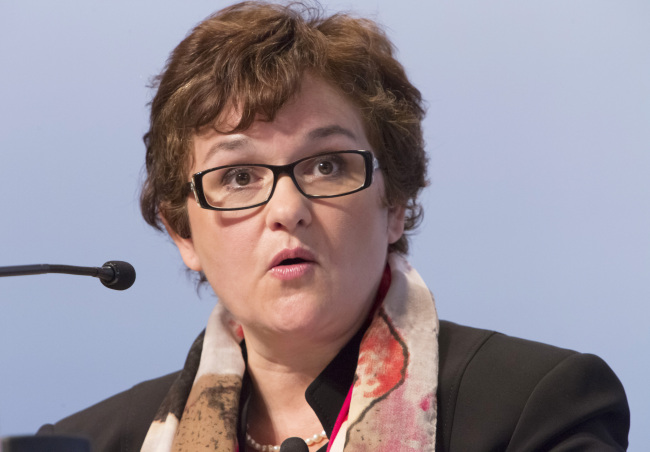ECB board member says no deflation in eurozone
Central bank weighs bond purchases up to $591b to juice economy
By Korea HeraldPublished : Jan. 11, 2015 - 21:14
BERLIN (AFP) ― ECB board member Sabine Lautenschlaeger has disputed in a magazine interview that the eurozone is now experiencing deflation and expressed skepticism about the central bank buying up sovereign bonds.
Markets surged this week as investors bet data showing prices fell year-on-year in the eurozone in December would push the ECB to launch massive purchases of government bonds, only to slump back on indications it may act cautiously.
“We are seeing persistent weak inflation, due to among other things the prices of energy and food having fallen sharply,” Lautenschlaeger said in an interview with the weekly Der Spiegel due to hit newstands on Saturday.
Markets surged this week as investors bet data showing prices fell year-on-year in the eurozone in December would push the ECB to launch massive purchases of government bonds, only to slump back on indications it may act cautiously.
“We are seeing persistent weak inflation, due to among other things the prices of energy and food having fallen sharply,” Lautenschlaeger said in an interview with the weekly Der Spiegel due to hit newstands on Saturday.

The 0.2 percent drop in consumer prices is the first fall in consumer price inflation in the eurozone in five years, and many analysts warn low energy prices could keep prices falling for an extended period.
Deflation is defined as an extended period of falling prices where consumers begin to put off purchases in expectation they will fall further, sparking a damaging cycle of falling production, employment and prices.
The ECB has been watching warily as inflation fell further away from its target level of just under 2 percent last year as oil prices tumbled by half.
ECB chief Mario Draghi has said the central bank could launch a quantitative easing program of purchasing government bonds like the U.S. Federal Reserve did during the global financial crisis to protect the eurozone from deflation. Some analysts see the ECB as now having little choice to do so at its next meeting on Jan. 22.
But Lautenschlaeger, who was formerly a deputy head of the German central bank, said “the purchase of sovereign bonds is for me the last option in monetary policy.”
“The benefits and the risks of such a program should counterbalance in a reasonable manner, and for me that isn’t currently the case,” she added.
Germany has voiced its reserves to the ECB launching a QE program, including Bundesbank chief Jens Weidmann, who also sits on the ECB’s governing council.
Draghi has said the ECB’s staff were asked to draft possible models for a QE program.
Bloomberg news agency reported on Friday that the ECB governing council has been presented scenarios including purchases of up to 500 billion euros ($591 billion) in investment-grade assets.
Markets were disappointed with that amount which is only half of the 1 trillion euros in the expansion in its balance sheet that the ECB has targeted to ward off deflation.
-
Articles by Korea Herald







![[KH Explains] Hyundai's full hybrid edge to pay off amid slow transition to pure EVs](http://res.heraldm.com/phpwas/restmb_idxmake.php?idx=644&simg=/content/image/2024/04/18/20240418050645_0.jpg&u=20240419100350)







![[From the Scene] Monks, Buddhists hail return of remains of Buddhas](http://res.heraldm.com/phpwas/restmb_idxmake.php?idx=652&simg=/content/image/2024/04/19/20240419050617_0.jpg&u=20240419175937)

![[KH Explains] Hyundai's full hybrid edge to pay off amid slow transition to pure EVs](http://res.heraldm.com/phpwas/restmb_idxmake.php?idx=652&simg=/content/image/2024/04/18/20240418050645_0.jpg&u=20240419100350)

![[Today’s K-pop] Illit drops debut single remix](http://res.heraldm.com/phpwas/restmb_idxmake.php?idx=642&simg=/content/image/2024/04/19/20240419050612_0.jpg&u=)